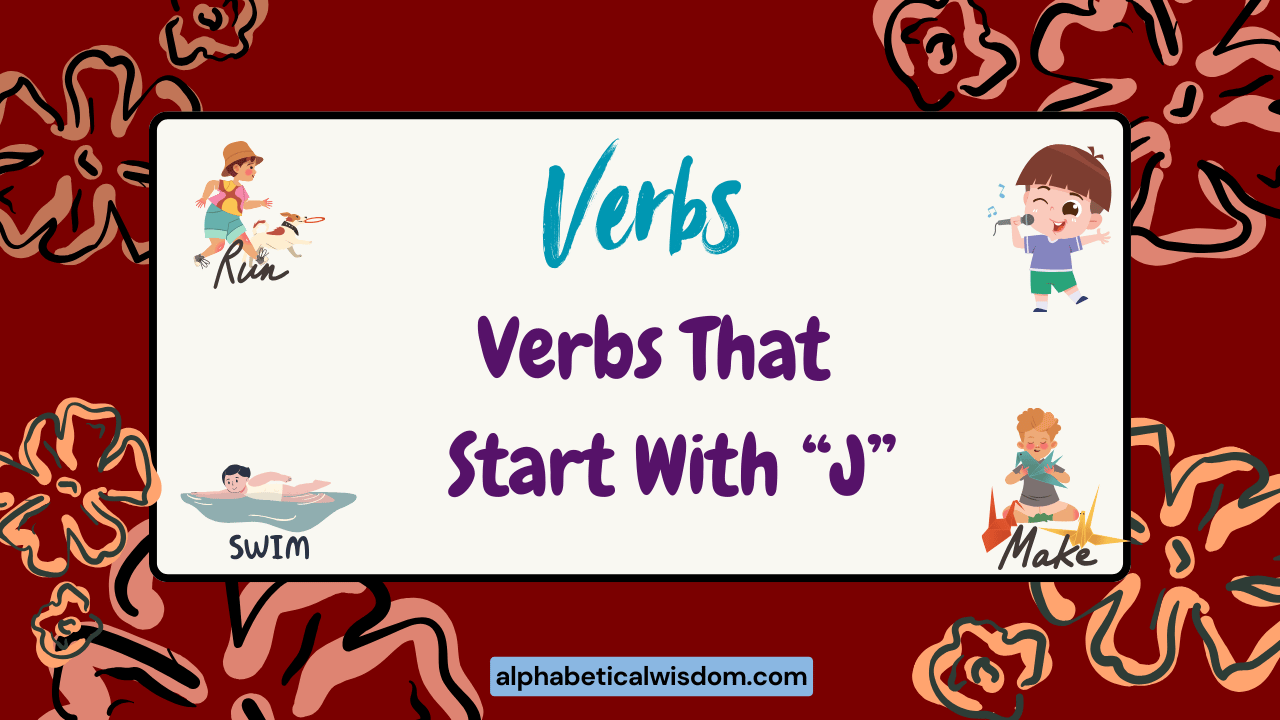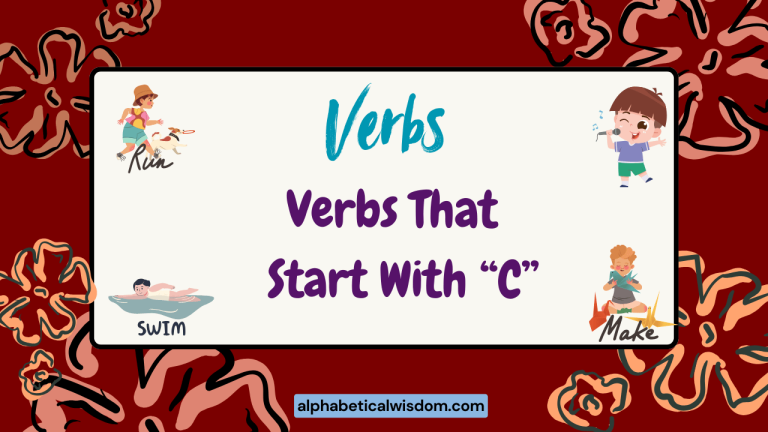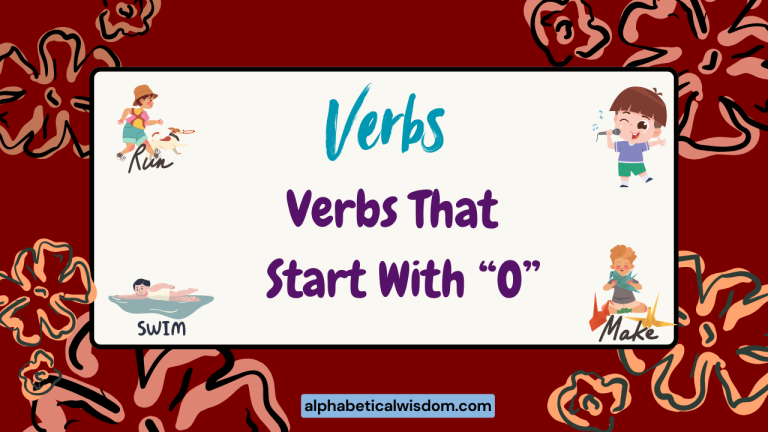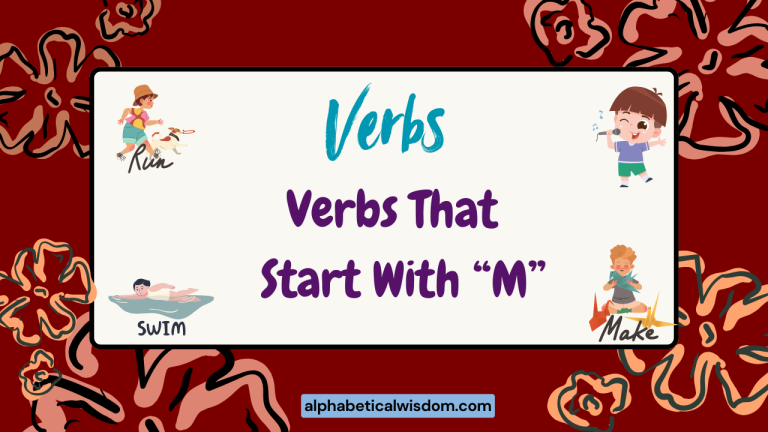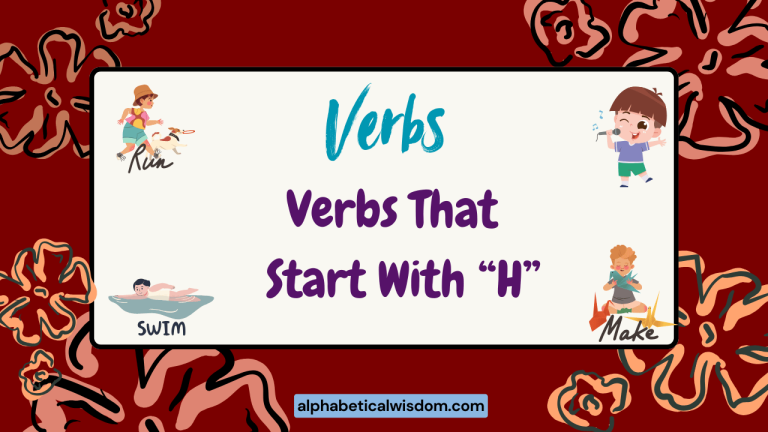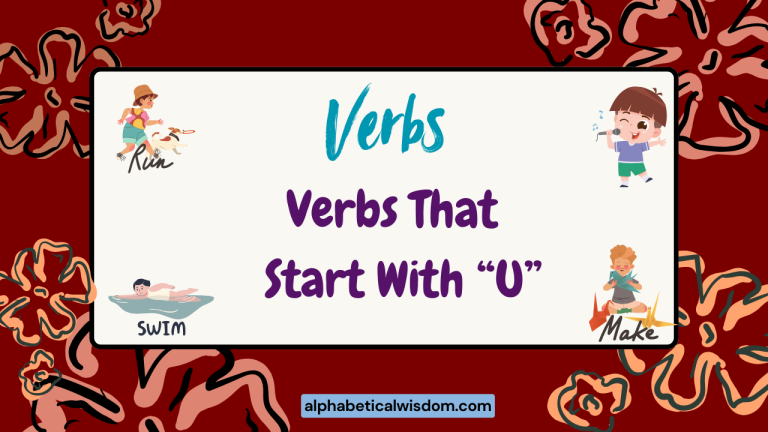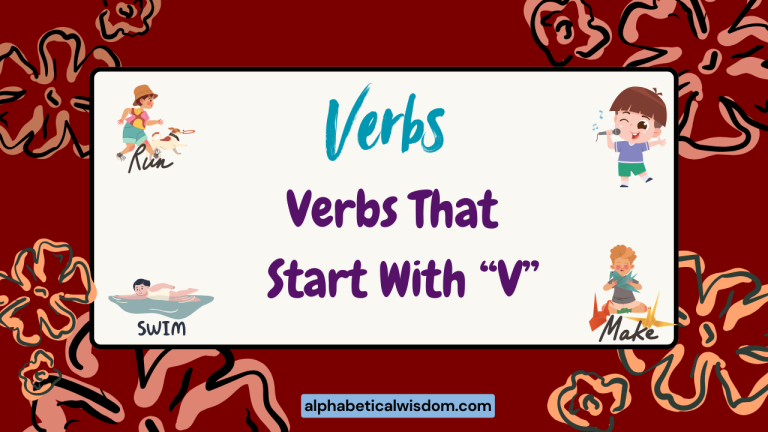Verbs That Start With J: A Comprehensive Guide
Mastering verbs is crucial for constructing grammatically correct and meaningful sentences in English. This article focuses specifically on verbs that begin with the letter “J,” offering a detailed exploration of their diverse forms, functions, and usage.
Understanding these verbs will significantly enhance your vocabulary and improve your ability to express yourself with precision and clarity. Whether you’re a student, a non-native speaker, or simply someone looking to refine your language skills, this guide provides the knowledge and practice you need to confidently use “J” verbs in your writing and speech.
Table of Contents
- Introduction
- Definition of Verbs Starting with J
- Structural Breakdown of Verbs
- Types and Categories of Verbs Starting with J
- Examples of Verbs Starting with J
- Usage Rules for Verbs Starting with J
- Common Mistakes with Verbs Starting with J
- Practice Exercises
- Advanced Topics
- FAQ
- Conclusion
Definition of Verbs Starting with J
A verb is a word that describes an action, occurrence, or state of being. Verbs are the backbone of any sentence, as they tell us what the subject is doing or being.
Verbs that start with “J” function just like any other verb in the English language, but they have a specific set of meanings and connotations based on their individual definitions. They can be classified based on their grammatical properties, such as transitivity (whether they take a direct object) and tense (past, present, future).
Verbs starting with ‘J’ encompass a range of actions, states, and processes. They can describe physical actions, mental activities, or social interactions.
For example, “jump” describes a physical action, “judge” describes a mental activity, and “join” describes a social interaction. The context in which a ‘J’ verb is used determines its specific meaning and how it contributes to the overall meaning of the sentence.
Classification of Verbs
Verbs can be classified based on several criteria, including:
- Action Verbs: Describe what someone or something does (e.g., jump, jog, jab).
- Linking Verbs: Connect the subject to a noun or adjective that describes or identifies the subject (e.g., is, are, was, were, seem—no “J” verbs are typically linking verbs).
- Auxiliary Verbs (Helping Verbs): Assist the main verb to express tense, mood, or voice (e.g., have, be, do—no “J” verbs are typically auxiliary verbs).
- Transitive Verbs: Require a direct object to complete their meaning (e.g., judge (a contest), join (a club)).
- Intransitive Verbs: Do not require a direct object (e.g., jump, jog).
Function of Verbs Starting with J
Verbs starting with “J” serve the same functions as any other verb, acting as the core of a sentence’s predicate. They indicate the action, occurrence, or state of being related to the subject.
The specific function of a “J” verb depends on its meaning and how it’s used within the sentence structure. They determine the tense, aspect, and mood of the action being described.
Contexts of Verbs Starting with J
Verbs starting with “J” can be used in various contexts, including:
- Descriptive Writing: To paint a vivid picture of actions and events (e.g., “The athlete jumps over the hurdle.”).
- Narrative Writing: To tell a story and move the plot forward (e.g., “She joined the team last year.”).
- Expository Writing: To explain a process or provide information (e.g., “The judge justifies his decision.”).
- Conversational Speech: To communicate everyday actions and thoughts (e.g., “I jog every morning.”).
Structural Breakdown of Verbs
Understanding the structure of verbs is essential for using them correctly. Verbs have different forms to indicate tense, aspect, mood, and voice.
The principal parts of a verb are the base form, the past tense, the past participle, and the present participle.
Base Form
The base form is the infinitive form of the verb without “to” (e.g., jump, join, judge). It is used in the present tense (except for the third-person singular) and with modal verbs (e.g., can, will, should).
Past Tense
The past tense indicates an action or state that occurred in the past. For regular verbs, the past tense is formed by adding “-ed” to the base form (e.g., jumped, joined).
Irregular verbs have different forms for the past tense (e.g., “jettisoned” is regular, but there are no common irregular “J” verbs).
Past Participle
The past participle is used with auxiliary verbs to form perfect tenses (e.g., have jumped, had joined) and passive voice constructions (e.g., was judged). For regular verbs, the past participle is the same as the past tense (e.g., jumped, joined).
Irregular verbs often have a different form for the past participle.
Present Participle
The present participle is formed by adding “-ing” to the base form (e.g., jumping, joining, judging). It is used with the auxiliary verb “be” to form continuous tenses (e.g., is jumping, was joining).
Types and Categories of Verbs Starting with J
Verbs beginning with the letter “J” can be categorized based on their meaning and usage. Some common categories include verbs of movement, judgment, connection, and creation.
Movement Verbs
These verbs describe physical movement or motion. Examples include:
- Jump: To push oneself off the ground and into the air.
- Jog: To run at a slow, steady pace.
- Jet: To travel by jet aircraft.
- Jerk: To move abruptly or suddenly.
Judgment Verbs
These verbs involve making evaluations or decisions. Examples include:
- Judge: To form an opinion or evaluation about something.
- Justify: To show or prove to be right or reasonable.
Connection Verbs
These verbs describe joining or linking things together. Examples include:
- Join: To become a member of a group or organization.
- Junction: To connect or intersect (often used as a noun, but can be used as a verb).
Creation Verbs
These verbs involve creating or producing something. Examples include:
- Jazz: To enliven or make more exciting (often used metaphorically).
Examples of Verbs Starting with J
The following tables provide numerous examples of verbs starting with “J” used in various contexts. Each example illustrates the verb’s meaning and usage in a complete sentence.
Table 1: Examples of Movement Verbs Starting with J
This table provides examples of movement verbs that start with the letter ‘J’. These verbs describe physical actions related to motion, speed and direction.
| Verb | Example Sentence |
|---|---|
| Jump | The athlete jumped over the high bar with ease. |
| Jog | I jog in the park every morning to stay healthy. |
| Jet | We jetted off to Paris for a romantic vacation. |
| Jerk | He jerked the door open in frustration. |
| Jiggle | The loose handle jiggled when I tried to open the window. |
| Jive | The band jived to the rhythm of the music all night long. |
| Jolt | The sudden stop jolted me forward in my seat. |
| Journey | They journeyed across the desert for many days. |
| Jounce | The car jounced over the bumpy road. |
| Jaunt | We jaunted into town for a quick shopping trip. |
| Jump-start | He needed to jump-start his car because the battery was dead. |
| Jackknife | The truck jackknifed on the icy road, causing a major accident. |
| Jam | The crowd jammed into the concert hall, eager to see their favorite band. |
| Jeer | The fans jeered at the opposing team, trying to distract them. |
| Jettison | The pilot jettisoned the fuel tanks to lighten the aircraft. |
| Join | The two rivers join together to form a larger waterway. |
| Juggle | The clown juggled three balls while riding a unicycle. |
| Jumped | The cat jumped onto the counter to steal some food. |
| Jostle | People jostled each other to get a better view of the parade. |
| Jazz | He jazzed up his old car with new paint and accessories. |
| Jerked | The fisherman jerked the fishing rod to set the hook. |
| Jeopardize | His reckless behavior jeopardized the safety of the entire team. |
| Jest | They jested and joked around to lighten the mood. |
| Job | He jobbed in the construction industry during the summer. |
| John | He johned Hancock’s signature on the Declaration of Independence. |
| Join | The carpenter joined the two pieces of wood together seamlessly. |
| Joke | They joked and laughed throughout the entire evening. |
| Jolt | The earthquake jolted the entire city awake. |
| Journeyed | The explorers journeyed into the unknown in search of new lands. |
Table 2: Examples of Judgment Verbs Starting with J
This table demonstrates how judgment verbs starting with ‘J’ are used to assess, evaluate, and form opinions. These verbs often involve critical thinking and decision-making processes.
| Verb | Example Sentence |
|---|---|
| Judge | The panel will judge the entries based on creativity and originality. |
| Justify | The lawyer tried to justify his client’s actions to the court. |
| Jeopardize | His careless actions could jeopardize the entire project. |
| Jettison | The company decided to jettison the unprofitable division. |
| Joke | Don’t joke about serious matters. |
| Jeer | The crowd began to jeer when the player missed the shot. |
| Justified | The teacher justified the assignment’s difficulty by explaining its importance. |
| Judging | She is judging the merits of each proposal carefully. |
| Judged | The contest was judged fairly and impartially. |
| Juries | The juries are still out on whether the new policy is effective. |
| Jury | The jury deliberated for hours before reaching a verdict. |
| Judges | The competition judges are experts in their respective fields. |
| Judging | Judging from the evidence, the defendant is likely guilty. |
| Justifies | The end never justifies the means. |
| Justifying | He is justifying his decision with flawed logic. |
| Judged | His performance was judged to be outstanding. |
| Judge | You shouldn’t judge a book by its cover. |
| Justify | Can you justify spending so much money on that? |
| Jeopardize | Don’t jeopardize your future with bad decisions. |
| Judged | The quality of the artwork was carefully judged by the panel. |
| Justified | The company justified the price increase due to rising costs. |
| Judging | The committee is currently judging the applications. |
| Jury | The jury will decide the fate of the accused. |
| Judges | The judges announced the winners of the competition. |
| Justifies | The situation justifies taking immediate action. |
| Jeopardizes | His behavior jeopardizes his chances of success. |
| Judgment | The manager exercises sound judgment in all his decisions. |
| Jeopardized | The company’s reputation was jeopardized by the scandal. |
| Judging | Judging by the weather forecast, it’s going to rain tomorrow. |
Table 3: Examples of Connection Verbs Starting with J
This table illustrates connection verbs that start with ‘J’, focusing on how they describe the act of joining, linking, or uniting different elements or individuals.
| Verb | Example Sentence |
|---|---|
| Join | I decided to join the local hiking club this year. |
| Junction | The two roads junction at the edge of town. |
| Joint | The carpenter jointed the two pieces of wood together seamlessly. |
| Joined | She joined forces with her colleagues to complete the project. |
| Joining | He is joining the military after graduation. |
| Joins | The river joins the ocean after flowing through the valley. |
| Jointed | The plumber jointed the pipes to prevent leaks. |
| Joining | They are joining the conference call remotely. |
| Joined | The company joined a partnership with a local charity. |
| Join | We will join hands in solidarity to support the cause. |
| Joining | The artist is joining different textures to create a unique piece. |
| Joined | The club members joined in a chorus of laughter. |
| Join | Please join us for dinner tonight. |
| Junction | The railroad tracks junction outside the city. |
| Joint | The architect jointed the beams together to create a strong structure. |
| Joined | The two companies joined to form a larger corporation. |
| Joining | She is joining the debate team to improve her public speaking skills. |
| Joins | He joins the meeting every week to provide updates. |
| Jointed | The jeweler carefully jointed the pieces of the necklace. |
| Joining | The students are joining the study group to prepare for the exam. |
| Joining | The wires are joining to complete the circuit. |
| Joins | The music joins the lyrics to create a beautiful song. |
| Joined | The committee joined forces to address the pressing issue. |
| Join | You can join the discussion by sharing your thoughts and opinions. |
| Junction | The highway junction is often congested during rush hour. |
| Joint | The construction workers jointed the concrete slabs together. |
| Joining | The countries are joining efforts to combat climate change. |
| Joined | The research team joined forces with a university to conduct the study. |
| Join | We invite you to join us in celebrating this special occasion. |
Table 4: Miscellaneous Verbs Starting with J
This table shows a variety of verbs beginning with ‘J’ that don’t fit neatly into the categories above. These verbs represent a diverse range of actions and states.
| Verb | Example Sentence |
|---|---|
| Jazz | He likes to jazz up his presentations with colorful visuals. |
| Jest | They often jest with each other to lighten the mood. |
| Jettison | The astronaut had to jettison equipment to reduce weight. |
| Jinx | Don’t jinx our chances of winning by talking about it too much. |
| Job | He jobbed as a freelance writer for several years. |
| Joggle | The baby joggled the rattle to make noise. |
| John | He johned the letter with his signature. |
| Jollify | The party was meant to jollify everyone after a long week. |
| Jostle | People jostled each other to get a better view of the stage. |
| Journal | She journals every day to reflect on her experiences. |
| Journey | They journey to remote locations for research purposes. |
| Jubilate | The team will jubilate if they win the championship. |
| Judge | She is qualified to judge the competition. |
| Juggle | He can juggle multiple projects at the same time. |
| Juice | They juiced oranges every morning for breakfast. |
| Jump | She can jump to conclusions without enough evidence. |
| Justify | The company tries to justify its actions to the public. |
| Jape | The comedians loved to jape at each other during the show. |
| Jeopardize | He doesn’t want to jeopardize his chances of getting a promotion. |
| Jive | The band started to jive and get the audience moving. |
| Jolt | The loud noise jolted her awake. |
| Jam | The printer can jam if you use the wrong type of paper. |
| Jerk | The car jerked forward when he released the clutch. |
| Jest | They jest with each other to keep the mood light. |
| Jiggle | The loose doorknob jiggles when you try to open it. |
| Join | I hope you can join us for the party next weekend. |
| Journalize | Accountants must journalize all financial transactions. |
| Joust | The knights will joust in the tournament. |
| Jazz | Let’s jazz up this old dress with some new accessories. |
Usage Rules for Verbs Starting with J
Using verbs correctly involves following specific grammatical rules related to tense, subject-verb agreement, and voice. Understanding these rules ensures clarity and accuracy in your writing and speech.
Tense Agreement
Verbs must agree in tense within a sentence or paragraph. If you start writing in the past tense, generally maintain that tense unless there is a clear reason to switch.
For example:
- Correct: “She jumped over the puddle and then jogged down the street.” (Both verbs are in the past tense.)
- Incorrect: “She jumped over the puddle and then jogs down the street.” (Tense inconsistency.)
Subject-Verb Agreement
Verbs must agree in number with their subjects. Singular subjects take singular verbs, and plural subjects take plural verbs.
For example:
- Correct: “He jogs every morning.” (Singular subject “he” takes the singular verb “jogs.”)
- Correct: “They jog every morning.” (Plural subject “they” takes the plural verb “jog.”)
- Incorrect: “He jog every morning.” (Subject-verb disagreement.)
Active vs. Passive Voice
Verbs can be in the active or passive voice. In the active voice, the subject performs the action.
In the passive voice, the subject receives the action. For example:
- Active: “The judge justified his decision.” (The judge performs the action.)
- Passive: “The decision was justified by the judge.” (The decision receives the action.)
Irregular Verbs
While most verbs that starts with “J” are regular, it’s important to be aware of irregular verbs in English in general. Irregular verbs do not follow the standard “-ed” pattern for past tense and past participle forms.
However, most “J” verbs are regular.
Common Mistakes with Verbs Starting with J
Even experienced English speakers sometimes make mistakes with verb usage. Recognizing these common errors can help you avoid them in your own writing and speech.
Mistake 1: Incorrect Tense Usage
Using the wrong tense is a common mistake, especially for non-native speakers. This can lead to confusion and miscommunication.
For example:
- Incorrect: “I will jumped over the fence yesterday.”
- Correct: “I jumped over the fence yesterday.”
Mistake 2: Subject-Verb Disagreement
Failing to make the verb agree with the subject in number is another frequent error. This often happens when there are intervening phrases between the subject and the verb.
For example:
- Incorrect: “The group of students join the club.”
- Correct: “The group of students joins the club.”
Mistake 3: Misusing Active and Passive Voice
Using the passive voice when the active voice is more appropriate can make your writing sound awkward or unclear. For example:
- Awkward Passive: “The ball was jumped over by the dog.”
- Clear Active: “The dog jumped over the ball.”
Practice Exercises
Test your understanding of verbs starting with “J” with these practice exercises. Each exercise focuses on a different aspect of verb usage, such as tense, subject-verb agreement, and active/passive voice.
Exercise 1: Fill in the Blanks
Fill in the blanks with the correct form of the verb in parentheses.
| Question | Answer |
|---|---|
| 1. She ________ (jump) over the puddle. | jumped |
| 2. They ________ (jog) every morning. | jog |
| 3. He ________ (judge) the contest last year. | judged |
| 4. We ________ (join) the club next week. | will join |
| 5. The plane ________ (jet) off into the sky. | jetted |
| 6. The baby ________ (jiggle) the rattle. | jiggled |
| 7. He ________ (jerk) the door open. | jerked |
| 8. They ________ (journey) across the desert. | journeyed |
| 9. I ________ (jettison) the extra weight. | jettisoned |
| 10. The team ________ (jubilate) after winning. | jubilated |
Exercise 2: Correct the Errors
Identify and correct the errors in the following sentences.
| Question | Answer |
|---|---|
| 1. He jump over the fence. | He jumps over the fence. |
| 2. They was jogging in the park. | They were jogging in the park. |
| 3. She will judged the competition tomorrow. | She will judge the competition tomorrow. |
| 4. I am join the team next week. | I am joining the team next week. |
| 5. The plane jetted already. | The plane has jetted already. |
| 6. The baby jiggles the rattle now. | The baby is jiggling the rattle now. |
| 7. He jerked open the doors. | He jerked open the door. |
| 8. They journeyed across the seas. | They journeyed across the sea. |
| 9. I am jettisoned the extra loads. | I jettisoned the extra load. |
| 10. The team is jubilate after the wins. | The team is jubilating after the win. |
Exercise 3: Choose the Correct Verb Form
Choose the correct form of the verb from the options provided.
| Question | Answer |
|---|---|
| 1. They (jump, jumps) high in the air. | jump |
| 2. She (jog, jogs) every morning. | jogs |
| 3. He (judge, judges) fairly. | judges |
| 4. We (join, joins) the meeting later. | join |
| 5. The plane (jet, jets) quickly. | jets |
| 6. The baby (jiggle, jiggles) its hands. | jiggles |
| 7. He (jerk, jerks) when startled. | jerks |
| 8. They (journey, journeys) far and wide. | journey |
| 9. I (jettison, jettisons) the garbage. | jettison |
| 10. The team (jubilate, jubilates) when winning. | jubilates |
Advanced Topics
For advanced learners, exploring more complex aspects of verb usage can further enhance their understanding and fluency.
Phrasal Verbs with J
Phrasal verbs are combinations of a verb and a preposition or adverb that create a new meaning. While there aren’t many common phrasal verbs that start with “J,” understanding the concept is important.
Examples might include using “join in” (to participate) or “jazz up” (to make more exciting or attractive).
Subjunctive Mood
The subjunctive mood expresses hypothetical or desired situations. While not commonly used with “J” verbs, it’s worth knowing. For example, “I suggest that he join the team” (subjunctive “join”).
FAQ
Here are some frequently asked questions about verbs starting with “J.”
- What is a verb?
A verb is a word that describes an action, occurrence, or state of being. It is the core of the predicate of a sentence.
- How do I identify a verb in a sentence?
Look for the word that shows what the subject is doing or being. Verbs often change form to indicate tense (past, present, future).
- What is subject-verb agreement?
Subject-verb agreement means that the verb must agree in number (singular or plural) with its subject. A singular subject takes a singular
verb, and a plural subject takes a plural verb.
- What are the principal parts of a verb?
The principal parts of a verb are the base form, the past tense, the past participle, and the present participle.
- How do I use verbs correctly in different tenses?
Pay attention to the time frame you are writing about and use the appropriate tense to convey the timing of the action or state of being. Consistent tense usage is crucial for clarity.
Conclusion
Understanding and correctly using verbs that start with the letter “J” can significantly enhance your English language skills. By mastering their definitions, structural forms, and usage rules, you can communicate more effectively and precisely.
Remember to practice regularly and pay attention to common mistakes to refine your verb usage. With consistent effort, you’ll be able to confidently incorporate “J” verbs into your everyday writing and speech.
